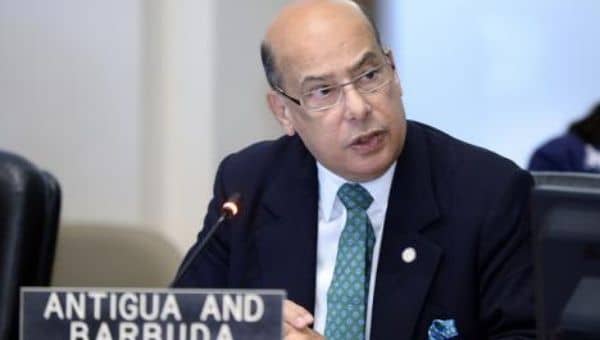
By Sir Ronald Sanders
(The writer is Antigua and Barbuda’s Ambassador to the U.S. and the OAS and High Commissioner to Canada. The views expressed are his own)
Except at time of crisis, many countries of the Caribbean Community (CARICOM) credit their foreign ministries and their embassies or high commissions abroad with little value.
Yet, diplomacy, which is the work of foreign ministries and their overseas missions, is the only instrument available to Caribbean states to further their national interests in an international community that is increasingly intolerant of small countries.
In this regard, foreign ministries and their diplomatic missions, properly functioning, play a vital role in defending and promoting the interests of Caribbean states. It is a role that should be continuously strengthened by utilizing the best persons available for diplomatic tasks, especially negotiating skills, and adequately resourcing their operations.
Recently, a notion that had popped-up in the past, re-emerged. It is that Caribbean countries should consider the establishment of a single diplomatic mission in foreign capitals to represent the interests of all CARICOM countries collectively. This notion has re-emerged recently because of financial challenges in some domestic economies. When the scissors-men in finance ministries, struggle to balance budgets or confront fiscal deficits, the usual area selected for the chopping block is foreign affairs – the business of advancing and defending the nation’s interests abroad.
However, admirable as the idea might be that CARICOM countries should have a single embassy in selected capitals and international institutions representing the interests of all, unless there is a political union of CARICOM countries the concept is impractical and unworkable. CARICOM countries would have to become a single federal state with a single federal government, a single federal legislature, making policies for all the states collectively before single representation could work. Only with such a political union could a single embassy operate effectively. No single embassy could represent the varied interests of all CARICOM states, particularly as some of those interests diverge sharply.
Recent voting in United Nations bodies and at the Organization of American States (OAS) amply demonstrate the contrasting positions of individual CARICOM states. There was no consistent position by the group and little effort to co-ordinate it, let alone to harmonize it. Each country’s representative voted or bargained in his or her own country’s interest.

So, in the absence of a political union of CARICOM states, and while CARICOM remains a community of “sovereign states”, foreign ministries and their overseas missions remain crucial to bargaining, lobbying and arguing for the individual states that they represent.
None of this is to discount the value of ‘associative diplomacy’ if it is pursued in matters of mutual interest. I discuss this concept, its utility and its limitations for small states in my book, “Crumbled Small: The Commonwealth Caribbean in World Politics”. One of the obstacles to associative diplomacy is that, while in the area of ‘low’ politics, such as support for a Caribbean candidate for an international post, most countries (not all) will act together; in ‘high’ politics, such as a choice between China and Taiwan and, recently, over whether or not to support a U.S. position on Venezuela and Nicaragua, there is no willingness for unified action. What is perceived as the interest of individual governments takes precedence.
Joint representation for the countries of the Caribbean Community should remain an aspiration that can best (and probably, only) be achieved when and if a political union is formed. Until then, associative diplomacy, when interests coincide, is the most that is attainable.
In her recent book, “Fascism – A Warning” (a compulsory read for insights into how autocrats gain and wield power), Madeleine Albright, a former U.S. Secretary of State and Professor at Georgetown University, describes the tools of foreign policy available to U.S. governments as follows: a range between “making polite requests to sending in the marines”. Offers could include “boxes of seeds” or “shipload of tanks”. Pressure could be applied “on the recalcitrant” by enlisting “international organizations to reinforce our requests”. Threats could include “economic and security sanctions”, “displays of military prowess in the country’s front yard”. And “covert means to disrupt a country’s activities”.
Caribbean countries have no weapons in its foreign policy arsenal that match those of the U.S. government or even of governments with far less power. In the execution of their foreign policies, Caribbean states cannot call on the influence of military or economic means; diplomacy is the only tool available to them.
To the uninitiated and uninformed, foreign policy is an abstract concept, distant from the livelihoods of people; it takes place in a far-off place in what is perceived as the glitz of cocktail receptions, rounds of parties and social chit-chat. The reality is quite different.
Where diplomatic work is actually done, it involves lengthy meetings; tough negotiations; crafting language that safeguards a nation’s interest; standing ground even in the face of bullying by representatives of powerful countries; acting to keep one’s country off black lists that would harm the economy; arguing against arbitrary reports that adversely affects a nation’s interests in tourism and financial services and threatens its participation in the world’s banking and trading system; and standing-up for respect for international law and the rules of the international system without which the rights, independence and territorial integrity of one’s country would be even more jeopardized than they already are. In other words, working in the interest of the livelihood and well-being of every man, woman and child in their home countries.
Therefore, diplomacy and the machinery for deploying it, should not be undervalued by Caribbean countries. It is both a shield and a trumpet in the struggle for their causes in the international community.
The solution to effective international representation in the global community is well-trained and competent diplomatic personnel who understand that the purpose of their vocation is to negotiate with states and agencies to safeguard their country’s rights and security, and to promote and advance its economic and social development, including forming alliances with others when interests coincide.
Diplomacy should not be discounted; every other area of the world invests in it for the benefits it can deliver when properly executed.
Responses and previous commentaries: www.sirronaldsanders.com
Advertise with the mоѕt vіѕіtеd nеwѕ ѕіtе іn Antigua!
We offer fully customizable and flexible digital marketing packages.
Contact us at [email protected]















